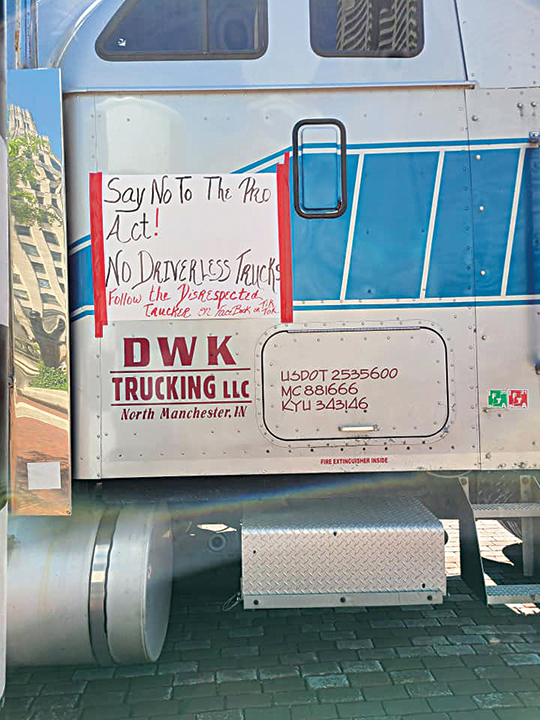The National Labor Relations Bill, known as the Protecting the Right to Organize (PRO) Act, is set to be a big win for unions and pro-union supporters. However, a nugget included in that act is set to shake the way owner-operators, and the companies that employ them, do business.
The PRO Act proposes three required prongs for independent contractors to meet in order to remain classified as independent contractors:
- The individual is free from control and direction in connection with the performance of the service, both under the contract for the performance of service and in fact.
- The service is performed outside the usual course of the business of the employer.
- The individual is customarily engaged in an independently established trade, occupation, profession or business of the same nature as that involved in the service performed.
The PRO Act can be easily compared to California’s Assembly Bill 5 (AB5), which was introduced by the U.S. Ninth Circuit Court of Appeals in 2019. AB5 holds the same prongs for independent contractors to meet as the PRO Act. Until recently, that law was under a preliminary injunction from being enforced on motor carriers and independent owner-operators after the California Trucking Association (CTA) pursued litigation with the state.
“Our big concern is the process of the ABC test,” said Bryce Mongeon, director of legislative affairs for the Owner-Operator Independent Drivers Association (OOIDA). “Basically, at least, an owner-operator who is working with a motor carrier is not going to be able to satisfy the test.”
Although this would cover gig workers with Uber or Lyft, it wouldn’t support current independent contract operations in the trucking industry. In a nutshell, the PRO Act will affect both independent contractors who are paid with a 1099 tax form and the companies who hire contractors for jobs.
If an independent contractor works with a business that transports goods, that will qualify as “the same course of business” and would fail to meet the “B” prong of the test. Under the PRO Act, those contractors could no longer be considered independent, but instead would be treated as employees.
“If you’re a trucking company, and your job is to deliver freight, why would you hire an independent contractor to deliver freight?” explained David Heller, vice president of government affairs for the Truckload Carriers Association (TCA). “This law would say that you wouldn’t be allowed to do that. You would have to make independent contractors employees, and quite frankly, they don’t want to be employees. This PRO Act jeopardizes that business model and would actually put an end to, basically, the trucking version of the American dream, that has demonstrated time and time again the success stories of companies like Swift Transportation and J.B. Hunt that started with just one person, one truck.”
The act changes the original definition of independent contractors, which are generally considered as those whose payers have the right to control the result of the work, but not what will be done or how it will be done, according to the Internal Revenue Service (IRS).
The PRO Act is part of President Joe Biden’s American Jobs Plan — also known as the infrastructure bill — but it could actually overturn jobs in the trucking industry.
Lisa Schmitt and her husband, Lee, own a truck and are leased to a motor carrier.
“We have two choices,” Schmitt said. “We can either quit trucking — which is what a lot of (owner-operators) will do — or get your own authority, and that’s not always the best way. There’s many places that we get loads from right now that if we were to go get our own authority tomorrow, they wouldn’t load us for six months because they want to see safety history.”
Jeremy Johnson, a truck driver and administrator of the Facebook group “The Disrespected Trucker,” has already decided he will leave the trucking industry if the PRO Act is implemented. He owns his truck and is leased to a company that primarily uses owner-operators.
“Guys like me, lease-term owner-operators, will have to go get our own authority and insurance and we — or I can’t — afford to go buy my own trailer and get my own insurance paid for my own authority,” Johnson said. “Not to mention, my insurance goes through the roof the first year because I’m a new insurance holder.”
So, Johnson said, he’ll sell his truck and leave because he’s “tired of the politicians attacking us for no reason.”
Johnson has been organizing protests at state capitals to protest the PRO Act and other issues in the trucking industry for three years now. He just returned from protesting the PRO Act, along with the disruption of trucking jobs, during the “May Day” protest held May 1-3 in Indianapolis.
“This will completely upend the trucking industry,” he said.

It is unclear whether owner-operators will be forced to get their own authority, according to OOIDA’s Mongeon. However, he does suspect the costs associated under the PRO Act will be prevalent for companies who must hire independent contractors as employees, as well as for independent contractors who have made the investments of buying equipment.
Schmitt said she suspects companies like Diamond Transportation, which solely relies on owner-operators, could go out of business as a result of the PRO Act’s “B” prong.
“It’s going to (depend on) how it’s deemed,” Schmitt said. “If they’re deemed as a carrier, meaning their industry is trucking goods, then they’re going to be gone because you can’t have an independent contractor with someone who does the same thing as what you do.”
To complicate the matter, companies would be required to provide the newly elected employees benefits and an equitable pay structure. Many companies could not afford this.
In an interview with The Trucker, Diamond Transportation president Jon Coca confirmed that the PRO Act could mean unemployment.
“We run a much bigger risk of simply having to close our doors,” he said. “Our insurance and benefits would have to stretch much longer than they are, and we’d have to redo all of our contracts. I don’t know if that’s feasible, when they’re owning their own equipment. To pay them a certain percentage of earnings or margins that are already so small and tight, the added extra expense to us would put us under.”
It wouldn’t just be Diamond Transportation. Many other carriers using an independent contractor business model could be at risk.
“Just in our company alone, you’re looking at 50 people losing their jobs,” Johnson said. “It’s 35 owner-operators, and I think he has three company drivers. I’m almost positive he wouldn’t be able to keep his doors open, because he has a lot of contracted freight that he relies on us for — and if he loses us, he’s gonna lose that contract to trade, and he’s just going to have to shut his doors.”
However, Coca, TCA and OOIDA said it is unlikely the PRO Act will ever pass. The act did pass in the U.S. House of Representatives March 9; however, it is unclear when it will be moved out of the U.S. Senate Committee on Health, Education, Labor and Pensions.
In order to pass the Senate, there must be 60 votes to overcome a filibuster that may be proposed by opponents of the bill. This would mean there must be 10 Republicans supporting the bill for it to pass. However, the Senate may choose the budget reconciliation route to create a simple majority vote for measures such as revenues, spending or debt.
Some proposed legislation does not qualify for the budget process. Already, elements of Biden’s infrastructure bill — which contains the PRO Act — are expected to use the reconciliation route, according to the Associated Press.
“The rules of reconciliation are strictly tied to budgetary items,” Heller said. “The PRO Act does not represent a budgetary item.”
California’s AB5 had been blocked from being enforced against motor carriers after a request from CTA to place a preliminary injunction.
However, an April 28 ruling to overturn the injunction is likely to affect 70,000 truck drivers who can be classified as employees of companies that hire them instead of as independent contractors, giving them a right to overtime, sick pay or other benefits. The circuit court in San Francisco overturned a ruling last year by a federal judge that said federal interstate transportation law preempted 2019’s AB5.
“We continue to stand by our initial claim that the implementation of AB5’s classification test is preempted by federal law and is clearly detrimental to the long-standing and historical place California’s 70,000 owner-operators have had in the transportation industry,” said Shawn Yadon, CEO of CTA, in a statement on April 28. “The California Trucking Association will take any and all legal steps necessary to continue this fight on behalf of independent owner-operators and motor carriers operating in California.”
The Dynamex Operations West Inc. v. Superior Court of Los Angeles County decision paved the way for California’s AB5 and the federal-level PRO Act to originate. The decision surrounded a case of employee misclassification, in which two delivery drivers sued Dynamex for misclassifying drivers as independent contractors rather than employees. Due to the confusion surrounding the case, the court determined to set up the ABC test to define independent contractors and employees.
CTA had argued the law could make it harder for independent drivers who own their trucks and operate on their own hours to make a living by forcing them to be classified as employees.
For organizations like the Teamsters union, the overturned injunction on AB5 and the passage of the PRO Act in the U.S. House are to “restore fairness to the economy at a time when the coronavirus pandemic has exacerbated income inequality, stifling the ability of far too many hardworking Americans to earn a decent wage that allows them to support their families,” according to a statement from Jim Hoffa, Teamsters General President.
Teamsters has 600,000 members in its freight division, which includes truck drivers as well as workers in packaging, mass transit and more.
“Research shows that workers want unions,” Hoffa said. “However, there is a huge gap between the share of workers with union representation and the share of workers that would like to have a union and a voice on the job. So-called ‘right to work’ is a big reason for that, but the PRO Act would override such state laws that have kept the wages of hard-working Americans down.
“The needs of workers have been ignored by too many elected officials for too long. COVID-19 has put too many on their heels,” Hoffa continued. “Meanwhile, the misclassification of workers is on the rise, and too many working Americans are falling through the cracks.”
The largest chunk of the PRO Act is dedicated to reshaping certain labor laws. The act would eliminate right-to-work protections, which prohibit employees from being persuaded to pay union fees as a result of their employment. Twenty-seven states have right-to-work laws.
The PRO Act could also prevent an employer from replacing a worker who has gone on strike, paving the way for more picketing and strikes, and allow a panel to broker agreements if an issue has not been resolved within 120 days.
Despite the support for the act by unions and supporters, the opposition against the small but heavily impactful ABC test weighs on OOIDA, TCA and owner-operators in the industry.
“It would allow independent contractors the right to organize, which basically says it would allow them the right to become a union — which quite frankly is the very antithesis of what an independent contractor is, because they are their own businessman. They negotiate their own rates; they advocate their own time; and allowing them to become union would be the direct opposite of what they actually would be,” Heller said.
Hannah Butler is a lover of interesting people, places, photos and the written word. Butler is a former community newspaper reporter and editor for Arkansas Tech University’s student newspaper. Butler is currently finishing up her undergraduate print journalism degree and hopes to pursue higher education. Her work has been featured in at least nine different publications.












Let’s make it REALLY easy for these politicians…go ahead and get the PRO act..and watch the transportation industry go down the drain..all of it..If this goes through..let them come and repo my truck..because I will quit…and let’s see how autonomous your trucks are..without owner operators..that would take off what? Half million trucks? Find drivers for them..EVERYTHING is moved by truck eventually..
You think its getting bad on store shelves now just wait pass this you will loose so many trucks and nothing will make it to the stores. Stalk up people things might be getting pretty bad